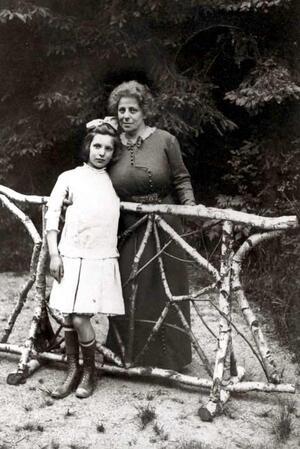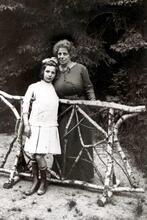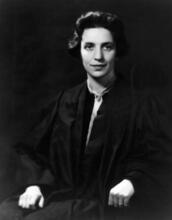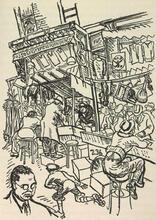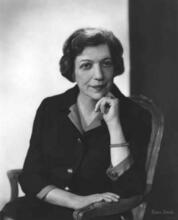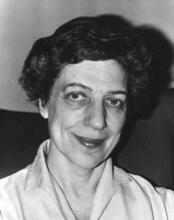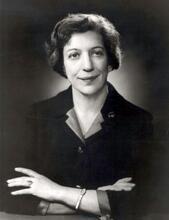Justine Wise Polier
As the first woman judge appointed in New York, Justine Wise Polier focused on helping the most vulnerable population: children. Born to an outspoken rabbi father and a mother deeply involved in volunteer work, Polier took up the family tradition of social justice in college by helping textile workers unionize. As a young lawyer, she criticized the corrupt and racist social services of the time. Becoming a judge meant the chance to change the system from within. From the bench, Polier helped reform both foster care and the school system, ensuring that minority children had access to services. She also worked an informal second shift, volunteering for important causes ranging from prison reform to trying to evacuate Jewish children from Europe during the Holocaust.
A distinguished judge of the New York City Family Court for thirty-eight years, Justine Wise Polier promoted the rights of children inside and outside of the judiciary. Espousing an activist concept of the law and a rehabilitative rather than a punitive model of judicial process, she pioneered the establishment of mental health, educational, and other rehabilitative services for troubled children. She also took a leading role in opposing racial and religious discrimination in public and private facilities. As a committed Jewish leader, she spoke out against antisemitism, urging Jews to lead the battle for human rights for all minorities.
Family and Education
Polier’s passionate advocacy for the rights of children, the poor, and minorities was a family legacy. Born on April 12, 1903, in Portland, Oregon, where her father, Rabbi Stephen Wise, accepted his first pulpit and became Oregon’s first (unpaid) commissioner of child welfare, Justine was much influenced by her father’s social concerns and those of her mother Louise Waterman Wise, a painter and social reformer. Louise Wise organized the Free Nurses’ Association in Portland to provide free medical and nursing care for poor mothers and children. She continued her charitable work on behalf of women and children when the Wises moved to New York City in 1905. Most notably, Louise Wise founded the Child Adoption Agency of the Free Synagogue in 1916, which her husband had established nine years earlier, to find homes for Jewish orphans and other hard-to-place children. Eventually known as the Louise Wise Services, the agency also provided services to unmarried pregnant women. In later years, Polier would succeed her mother as chair of the agency’s board; she also succeeded her mother as president of the Women’s Division of the American Jewish Congress. Polier also served as national vice president of the congress.
After attending the Horace Mann High School, Justine enrolled in Bryn Mawr College in 1920, transferring to Radcliffe College for her third year. While at Radcliffe, she worked at the Elizabeth Peabody Settlement House in Boston, teaching English to foreign residents. She spent her last year at Barnard College, graduating in 1924. Although an economics major, she took philosophy courses with John Dewey and educational psychology with William Kilpatrick at Teachers College. At Barnard, she took part in a New York State Labor Department investigation of industrial accidents suffered by women workers, a project that furthered her interest in women and the labor movement.
The Textile Mills and Law School
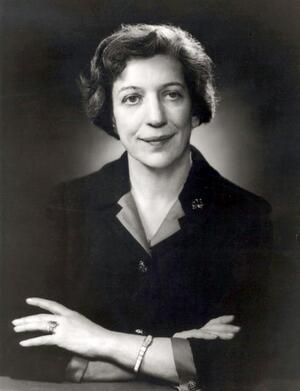
A fighter throughout her life for the rights of children and minorities, Justine Wise Polier was a judge of the New York City Family Court for thirty-eight years. She attributed her main goals of fighting injustice and "speaking truly… without fear" to the influence of the Hebrew prophets and her father, Rabbi Stephen Wise.
Institution: American Jewish Historical Society
After college, Polier obtained a job in the textile mills in Passaic, New Jersey, to learn about factory life firsthand. Fearing that she would not be hired if she was identified as the daughter of Rabbi Wise, well known for his pro-union sentiments, she used her mother’s maiden name. When her identity was discovered, she was fired and blacklisted. She then studied briefly at the International Labor Office of the League of Nations in Geneva, Switzerland.
Heeding her father’s advice to study law if she wanted to foster social justice, Polier enrolled in Yale University Law School in 1925. One of a handful of women law students, she was elected to Coif, the honorary legal society, and became an editor of the Yale Law Journal. Midway through her second year, several thousand workers went out on strike at the Passaic textile mills. Much to the displeasure of Yale’s president, she became deeply involved in the strike, commuting back and forth between New Haven and Passaic. With her father’s encouragement, she addressed strike rallies, urging workers to persist in their fight. Newspapers wrote about her as the “Joan of Arc of the mills,” and provided interviews and photos of this “rabbi’s daughter ... threatened with arrest” because of her role in the strike.
At the end of her second year at Yale, she married a young law school professor, Leon A. Tulin. He died from leukemia in 1932, leaving her with a young son, Stephen. She married her second husband, Shad Polier, a civil liberties lawyer, four years later; their children are Jonathan Wise Polier and Trudy (Polier) Festinger.
From 1929 to 1934, Polier served as the first woman referee in the Workmen’s Compensation Division of the New York State Department of Labor, directing a critical study of New York City’s referee system. This work led to her appointment as head of a Commonwealth Fund research survey on national labor laws. She became secretary and counsel to the Mayor’s Committee on Unemployment Relief, producing what the New Republic called the “best report on the problem of relief for the unemployed ever issued in the United States.”
Judgeship
In 1934, New York mayor Fiorello LaGuardia appointed Polier to the post of assistant corporation counsel, heading the Workmen’s Compensation Division. In the following year, he appointed her to a judgeship in the city’s domestic relations court (the predecessor to the family court)—the first woman in New York State to hold a judicial post above magistrate and the youngest municipal justice in the country. She took a leave of absence in 1941–1942 to serve as special counsel and deputy chair of the Office of Civilian Defense, working closely with Eleanor Roosevelt. With Eleanor Roosevelt and others, Polier founded in 1942 the Wiltwyck School for Boys for emotionally disturbed black youngsters; the school soon became nonsectarian. Under her leadership, the Louise Wise Services adoption agency also became a nonsectarian provider.
The Law as an Agent of Social Change
Polier was an activist judge who believed that the law should be used as an agent of social change. Calling on the resources of the social and behavioral sciences to aid judges in treating offenders, she made her court into a national laboratory of communication between the legal system, the behavioral sciences, and the human services delivery system. She vigorously opposed race and religion as being the predominant criteria for determining placement and other services for children. In the Skipwirth attendance case (1958–1961), she found that de facto segregation existed in schools in Harlem. She helped initiate a class action suit (Wilder v. Sugarman, 1971–1978), against all private and public foster care agencies (including the Louise Wise Services) for racial discrimination. With her husband, she wrote New York State’s first antidiscrimination law.
Polier was the guiding force behind the formation of the Citizens Committee for Children, a powerful advocacy group for children. A meeting at her home in 1960 set in motion a sustained effort for welfare reform. She also helped to mobilize lawyers on behalf of the poor. As vice president of the American Jewish Congress, Polier participated in social action, civil rights, education, and welfare initiatives. With her husband, who drafted much of the Congress’s civil liberties legislation, she set the organization on a course that combined a passionate commitment to Jewish life with an equally passionate concern for the rights of minorities.
Other Work and Legacy
After retiring from the bench in 1973, Polier served as the director of the Juvenile Justice Division of the Children’s Defense Fund, advocating enhanced services and protections for children throughout the United States. She was president of the Marion E. Kenworthy–Sarah H. Swift Foundation, and served on the boards of the Tappanz Foundation, the Field Foundation, and the Eleanor Roosevelt Institute. She died on July 31, 1987, at the Columbia-Presbyterian Medical Center in New York City.
As a “fighting judge” and in her extrajudicial work, Polier consistently challenged practices that she considered not to be in the best interests of the child—“best interests” being a concept she helped to develop. In her leadership of the American Jewish Congress, she sought to further Jewish interests, including those of women, while also working to foster civil liberties for minorities. She attributed her main goals—fighting injustice and “speaking truly ... without fear”—to the influence of the Hebrew prophets and her father Stephen Wise. Like both her parents, Polier was widely considered to be a voice of conscience for her era.
Selected Works by Justine Wise Polier
Back to That Woodshed (1956)
Everybody’s Child, Nobody’s Child (1943)
Juvenile Justice in Double Jeopardy: The Distanced Community and Vengeful Retribution (1989)
The Rule of Law and the Role of Psychiatry (1968)
A View from the Bench (1964).
Antler, Joyce. The Journey Home: Jewish Women and the American Century. New York: Schocken Books, 1997.
BEOAJ.
De Forest, Jennifer. “Tilting at Windmills? Judge Justine Wise Polier and a History of Justice and Education in New York City.” History of Education Quarterly 49, no.1 (February 2009): 68-88.
Herman, Ellen. “The Difference Difference Makes: Justine Wise Polier and Religious Matching in Twentieth-Century Child Adoption.” Religion and American Culture: A Journal of Interpretation 10, no. 2 (Winter 2000): 57-98.
UJE.
WWIAJ (1938).

